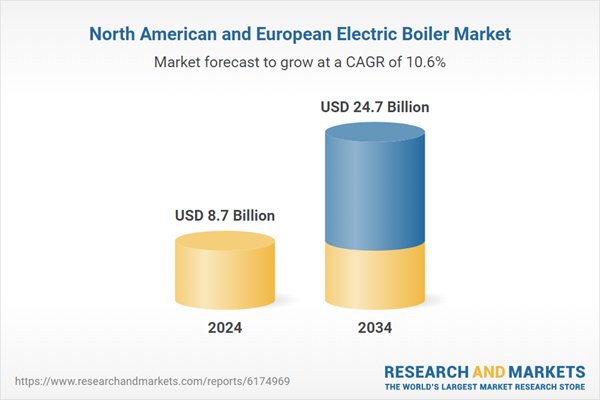This growth is fueled by rising demand for energy-efficient heating systems, backed by policy-level support and fiscal incentives aimed at promoting low-carbon solutions. Electric boilers, which operate without combustion, are gaining popularity for their quiet operation, compact design, and minimal maintenance requirements. These systems offer high thermal efficiency and accurate temperature control, making them ideal for both domestic and industrial applications. Intensifying focus on zero-emission infrastructure, alongside regulatory pressure to reduce NOx and SOx emissions, is reshaping the industrial and commercial heating landscape across these regions.
Ongoing investment in power grid modernization and significant improvements in electric boiler design, especially those focused on compactness and high capacity, are helping drive wider adoption. As industries increasingly transition from fossil-based systems to electrified heating solutions, R&D into more advanced boiler technologies continues to grow. The push for cleaner energy alternatives and decarbonization, coupled with rapid urban development and infrastructure expansion, is solidifying the market’s position across residential, commercial, and industrial sectors.
The electric boiler segment in the >100-250 MMBtu/hr capacity range generated USD 145 million in 2024. Demand is supported by evolving regulatory standards promoting cleaner technologies and reduced fossil fuel dependency. These boilers are gaining traction for their compact footprint and reduced operational complexity, particularly in settings where floor space is a premium and downtime must be minimized. Favorable policy frameworks and financial benefits further reinforce adoption across large-scale industrial environments.
The commercial segment generated USD 1 billion in 2024. Growing upgrades across public infrastructure, particularly in educational institutions, are driving installations of modern electric boiler systems. Offices and commercial facilities are steadily moving toward electric HVAC systems in pursuit of long-term cost savings and carbon footprint reduction. As more businesses prioritize sustainable practices, the shift to fully electrified heating systems is accelerating across both new and retrofit projects.
North America Electric Boiler Market is expected to reach USD 2.2 billion by 2034. Advancing heating technology, paired with steady industrial growth, is driving product demand across multiple sectors. The region’s resurgent manufacturing activity and continued capital infusion in infrastructure projects are enhancing market penetration. The growing interest in high-efficiency, low-maintenance heating systems is reinforcing adoption across both urban and rural areas.
Key players in the North America & Europe Electric Boiler Market include Lochinvar, Bosch Industriekessel, Cerney, Ariston Holding, KOSPEL, Cleaver-Brooks, CARRIER, Bradford White Corporation, WM Technologies, Ecotherm Austria, Clayton Industries, STIEBEL ELTRON, Thermona, Precision Boiler, Thermon, Vapor Power International, Vaillant Group, ALFA LAVAL, Babcock Wanson, Ferroli, Danstoker, Fulton, Hi-Therm Boilers, FONDITAL, Vattenfall, Viessmann, and Flexiheat UK. Leading companies in the North America & Europe Electric Boiler Market are focusing on product innovation and energy efficiency to strengthen their market positions. Many are advancing R&D to develop compact, high-capacity boilers with enhanced thermal control and reduced maintenance needs. Expanding smart integration features for real-time monitoring and diagnostics is also becoming a key differentiator. Strategic partnerships with utility providers and government-backed initiatives allow companies to tap into larger projects, especially in urban redevelopment and green infrastructure.
Comprehensive Market Analysis and Forecast
- Industry trends, key growth drivers, challenges, future opportunities, and regulatory landscape
- Competitive landscape with Porter’s Five Forces and PESTEL analysis
- Market size, segmentation, and regional forecasts
- In-depth company profiles, business strategies, financial insights, and SWOT analysis
This product will be delivered within 2-4 business days.
Table of Contents
Companies Mentioned
The key companies profiled in this North America and Europe Electric Boiler market report include:- ALFA LAVAL
- ACV
- Ariston Holding
- Babcock Wanson
- Bosch Industriekessel
- Bradford White Corporation
- CARRIER
- Cerney S.A
- Clayton Industries
- Cleaver-Brooks
- Danstoker
- Ecotherm Austria
- Ferroli
- Flexiheat UK
- FONDITAL
- Fulton
- Hi-Therm Boilers
- KOSPEL
- Lochinvar
- Precision Boiler
- STIEBEL ELTRON GmbH & Co. KG
- Thermon
- Thermona
- Vaillant Group
- Vapor Power International
- Vattenfall
- Viessmann
- WM Technologies LLC
Table Information
| Report Attribute | Details |
|---|---|
| No. of Pages | 150 |
| Published | September 2025 |
| Forecast Period | 2024 - 2034 |
| Estimated Market Value ( USD | $ 8.7 Billion |
| Forecasted Market Value ( USD | $ 24.7 Billion |
| Compound Annual Growth Rate | 10.6% |
| Regions Covered | Europe, North America |
| No. of Companies Mentioned | 29 |









